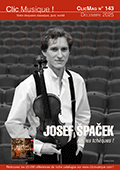 Avec ce CD, Mario Venzago achève son intégrale des symphonies de Bruckner. Sa lecture de la monumentale 5° symphonie en surprendra plus d’un ; avec un orchestre de dimensions réduites, Venzago opte pour une transparence qui place Bruckner dans la descendance de Haydn, Schubert et … Rossini. Cette symphonie que Venzago, fidèle à son idée de donner des programmes mystiques sous-jacents à chaque partition de Bruckner baptise « Les saintes écritures » sonne ainsi de façon totalement inattendue. Venzago tourne le dos à une tradition germanique qui faisait de cette œuvre une sorte de pendant orchestral gigantesque de « Parsifal ». Ecoutez cette proposition très personnelle, que l’on pourra rejeter ou adorer mais qui ne laissera personne indifférent. Comme le dit le chef suisse dans l’analyse très fouillée de ses choix qui accompagne le CD, « mon interprétation se situe ainsi à la plus grande distance de celle de Sergiu Celibidache, ma préférée jusque là ». On ne saurait mieux dire… (Richard Wander)  As the conductor himself has stated : "I originally intended to record the symphonies in rapid succession over a period of two years at the most, in order to present all of them within approximately the same time frame. The project was supposed to capture one moment along my own path while reacting to the manifold developments in musical performance practice and their reception. For this reason, the recordings have also been assigned to various orchestras – so as not to block and overburden any one ensemble with this one project. Although I did not proceed as quickly with the whole as I had planned, I nevertheless made very swift and steady progress. Moreover, the quality of the individual, so very different orchestras reflects the manifoldness of Bruckner’s own expressive possibilities. The goal was a concretization, as much as possible, an interference-free one, of an artistic idea appearing to me to be in urgent need of realization". This interpretation of the Fifth will probably make feelings run even higher than they have so far with Venzago’s previous renderings because, as he himself again writes, "The present reading does almost entirely without the song element and instead establishes musical discourse. The orchestra speaks and debates as if the instruments were the members of a parliament engaged in serious, sober, and brilliant discussion".
 |
